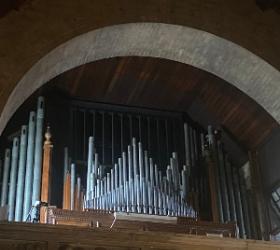
In the process of building an electronic index, the immense value of the Internet became apparent. The most difficult challenges were exemplified by two problems: the first was the need for easy data entry and the second was a need for universal access, once the work was completed.
Ease of data entry required a way to get data into the computer without bogging down in a laborious time and cost intensive process. Funds were not only "limited"—they were nonexistent. The solution to this problem was the work of volunteers who were retired organ enthusiasts. Typing assignments were organized into 10-hour blocks. Each volunteer had an assignment and, upon completion, sent the diskette to us. They could use any word processor and pace themselves at their best rate.
The second problem was not so easily solved. A "beta" version of the software was circulated with mixed results. Some users praised the work we had done and others replied with a litany of complaints relating to the software—they were very frustrated if it didn't work on their computer! It was obvious that we were facing a problem of universal access, as well as distribution, packaging and the like.
The answer to these problems became apparent one evening when your lowly scribe was surfing the net and came across the Early Music Archive at the University of Vienna School of Economics. It was our enormous good fortune that Gerhard Gonter, administrator of the archive, offered us a place on the "Osiris" computer. Thus, the Osiris Archive of organ specifications was born and with it, a home page for Herbert L. Heustis Index.
Technically, the Osiris Archive is a "Unix FTP Site" which means that it is completely transparent and "software free." The files on this site can be downloaded to any computer with any net browser or ftp software.
The reader can now see that we achieved both universal data entry and universal access. By eliminating the requirement for any particular software, we removed barriers to the use of the program and the acquisition of information. Over the last decade, there have been numerous announcements of "organ databases," but few actual accomplishments. It is a good guess that the gremlin that stops progress on these project is the need for specific software, formatting and hardware requirements. The Internet and the free-form databases that it makes possible solve these problems and allow database projects to go forward to completion. In its ninth decade of publication, Herbert L. Heustis salutes the Internet for making its electronic database possible.




